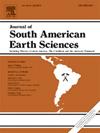Enhancing forensic applications through the mineralogy of clays in surface soil horizon: A case study of baixada fluminense, Southeast Brazil
IF 1.7
4区 地球科学
Q3 GEOSCIENCES, MULTIDISCIPLINARY
引用次数: 0
Abstract
Clay minerals possess chemical, mineralogical, and crystallographic characteristics that make them potential forensic markers, as they can reflect geochemical and weathering processes on a detailed scale. Therefore, this study aims to use the mineralogy of the clay fraction to distinguish samples from the surface soil horizons in four municipalities in Brazil, to assess the possibility of geographical tracking for forensic applications. Studies characterizing clays in environments with a variety of soil types in forensic pedology are necessary but still in their early stages. Furthermore, due to the high incidence of homicides involving the displacement of bodies in the region and the low resolution of these crimes, this research is crucial for geoscientific applications, with the potential for global replication. The samples were separated by centrifugation and analyzed using X-ray diffractometry, X-ray fluorescence, and thermogravimetry. Minerals were determined through quantitative mineralogical analyses using Rietveld and Biscaye methods. Additionally, in conjunction with the crystallographic parameters of kaolinite (Full Width at Half Maximum – FWHM), it was possible to form 8 Clay Mineral Assemblages and Gibbsite (CMAG), whose geographical delimitation considered geological and hydrographic aspects. The determination of CMAGs is based on mineralogy and is defined as follows: CMAG 1: kaolinite+(illite); CMAG 2: kaolinite+(gibbsite); CMAG 3: kaolinite + illite + montmorillonite; CMAG 4: kaolinite + illite+(gibbsite); CMAG 5: ordered kaolinite+(illite)+(gibbsite); CMAG 6: kaolinite + gibbsite+(illite); CMAG 7: disordered kaolinite + illite + gibbsite; CMAG 8: kaolinite+(illite)+(chlorite). The results indicate that the quantification of clay minerals in samples from surface soil horizons, FWHM, and the % of Al in goethite can represent valuable tools for forensic pedology. Moreover, through the characterization of iron and titanium (hydr)oxides, it was possible to distinguish samples with a distance of 335 m between them, further expanding the capability to identify the geographical origin of samples, making them potential forensic markers.
通过地表土壤层中粘土的矿物学特征加强法医应用:巴西东南部baixada fluminense的案例研究
粘土矿物具有化学、矿物学和晶体学特征,可以详细反映地球化学和风化过程,因此是潜在的法医标记。因此,本研究旨在利用粘土部分的矿物学特征来区分巴西四个城市的表层土壤层样本,以评估为法医应用进行地理追踪的可能性。在法医土壤学中,对各种土壤类型环境中的粘土特征进行研究是必要的,但仍处于早期阶段。此外,由于该地区涉及尸体移位的凶杀案发生率较高,而这些犯罪的分辨率较低,因此这项研究对于地球科学应用至关重要,并有可能在全球范围内推广。样本经离心分离后,使用 X 射线衍射仪、X 射线荧光仪和热重分析法进行分析。采用里特维尔德法和比斯卡耶法进行定量矿物学分析,确定矿物质。此外,结合高岭石的晶体学参数(半最大值全宽-FWHM),可以形成 8 个粘土矿物集合体和吉布斯岩(CMAG),其地理划分考虑了地质和水文方面的因素。CMAG 的确定以矿物学为基础,定义如下:CMAG 1:高岭石+(伊利石); CMAG 2:高岭石+(吉比石); CMAG 3:高岭石+伊利石+蒙脱石; CMAG 4:高岭石+伊利石+(吉比石); CMAG 5:有序高岭石+(伊利石)+(辉绿岩); CMAG 6:高岭石+辉绿岩+(伊利石); CMAG 7:无序高岭石+伊利石+辉绿岩; CMAG 8:高岭石+(伊利石)+(绿泥石)。结果表明,地表土壤层样本中粘土矿物的定量、全长平均值以及鹅卵石中的铝含量可以作为法医土壤学的重要工具。此外,通过铁和钛(氢)氧化物的特征描述,可以区分相距 335 米的样本,进一步扩大了识别样本地理来源的能力,使其成为潜在的法医标记。
本文章由计算机程序翻译,如有差异,请以英文原文为准。
求助全文
约1分钟内获得全文
求助全文
来源期刊

Journal of South American Earth Sciences
地学-地球科学综合
CiteScore
3.70
自引率
22.20%
发文量
364
审稿时长
6-12 weeks
期刊介绍:
Papers must have a regional appeal and should present work of more than local significance. Research papers dealing with the regional geology of South American cratons and mobile belts, within the following research fields:
-Economic geology, metallogenesis and hydrocarbon genesis and reservoirs.
-Geophysics, geochemistry, volcanology, igneous and metamorphic petrology.
-Tectonics, neo- and seismotectonics and geodynamic modeling.
-Geomorphology, geological hazards, environmental geology, climate change in America and Antarctica, and soil research.
-Stratigraphy, sedimentology, structure and basin evolution.
-Paleontology, paleoecology, paleoclimatology and Quaternary geology.
New developments in already established regional projects and new initiatives dealing with the geology of the continent will be summarized and presented on a regular basis. Short notes, discussions, book reviews and conference and workshop reports will also be included when relevant.
 求助内容:
求助内容: 应助结果提醒方式:
应助结果提醒方式:


